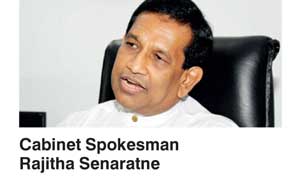Thursday Feb 26, 2026
Thursday Feb 26, 2026
Thursday, 5 January 2017 00:52 - - {{hitsCtrl.values.hits}}
By Dharisha Bastians
Facing a barrage of criticism over its decision to lease the Port and 15,000 acres for proposed industrial zone in Hambantota to a Chinese company, the Government yesterday defended the deal saying it would help to turn around white elephant projects in the former President Mahinda Rajapaksa’s hometown. 
Cabinet Spokesman Rajitha Senaratne told reporters yesterday that the joint venture between China Merchants Port Holdings Company Ltd. and the Sri Lanka Ports Authority would be signed as scheduled on 7 January, in spite of ongoing opposition to the proposal from the Joint Opposition and the JVP.
“No development ever takes place in this country without massive protests against it,” he charged.
He claimed that while the pro-Rajapaksa Joint Opposition had been sharply critical of the proposed joint venture with the Chinese firm that also manages the Colombo South Harbour container terminal – CICT – the proposal to designate a 15,000-acre industrial park in the southern district had first been made during President Mahinda Rajapaksa’s term in office.
Senaratne said he had made campaign pledges about the creation of the industrial zone that will border both the Hambantota and Moneragala Districts during the Uva provincial council polls in 2014.
“On campaign stages I told people that the industrial zone backed by a port and an international airport would turn Magampura into one of the most powerful regions of the country,” Minister Senaratne, who was a member of the Rajapaksa cabinet told the briefing at the Information Department last afternoon.
“I don’t remember Mahinda Rajapaksa objecting to the proposal then,” he added.
Senaratne claimed that while Rajapaksa had also campaigned strongly against the Norochcholai coal power project, the plant was finally completed and commissioned during his tenure in office.
“Today the energy crisis is being mitigated by that plant,” he asserted.
The Government had no choice but to consider management options for the Hambantota Port, Minister Senaratne claimed, because the port made revenue of only Rs. 10 million while its operational cost was about Rs. 590 million. “These are losses the Government has to incur, paid from taxes drawn from the people, no one else,” Senaratne said.
With the Colombo harbour extensions already handling the country’s transshipment cargo, the Minister explained that the main function of the Hambantota port should always have been oil bunkering for international vessels plying the international shipping lane situated only 12 nautical miles from the southern port. At this point ships plying this route detour to Bombay or Singapore to refuel, he claimed.
Opening the Hambantota port without a bunkering facility available in 2010, made it a vanity project named for Mahinda Rajapaksa and opened on his birthday, Minister Senaratne said.
“There was no logic in the port in Hambantota without a bunkering facility, and I told Mahinda Rajapaksa this back when he was President. Similarly there is no rationale to having an airport in Mattala without an industrial park,” he charged.
Senaratne said that the Government had requested international airlines to fly to Mattala while the BIA runway is under construction, which will require an eight-hour airport closure daily for three months. “They all refused. This airport cannot generate air traffic unless an infrastructure is built around it,” he explained.
On Saturday, 7 January, the Government hopes to sign an agreement with China Merchants Ports Holdings, under which Sri Lanka will lease 80% of the Hambantota port to the Chinese company for $ 1.12 billion for a period of 99 years. The Cabinet has already approved the deal.
The Rajapaksa led Joint Opposition and other groups have slammed the deal for its lack of transparency and the excessive lease period. The JVP is also strongly opposing the Government decision to lease 15,000 acres in Hambantota for an industrial park to the same Chinese company, claiming that it will deprive people of cultivatable land.
China Merchants Ports Holdings currently holds an 85% stake in the Colombo International Container Terminals in the Colombo south harbour, but on a build-operate-transfer (BOT) basis for 35 years. SLPA holds a 15% stake in CICT.